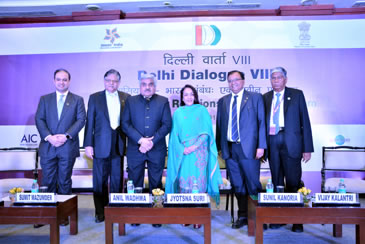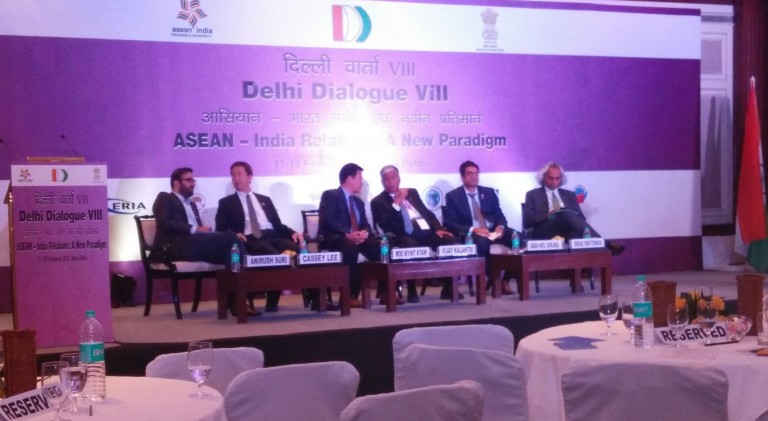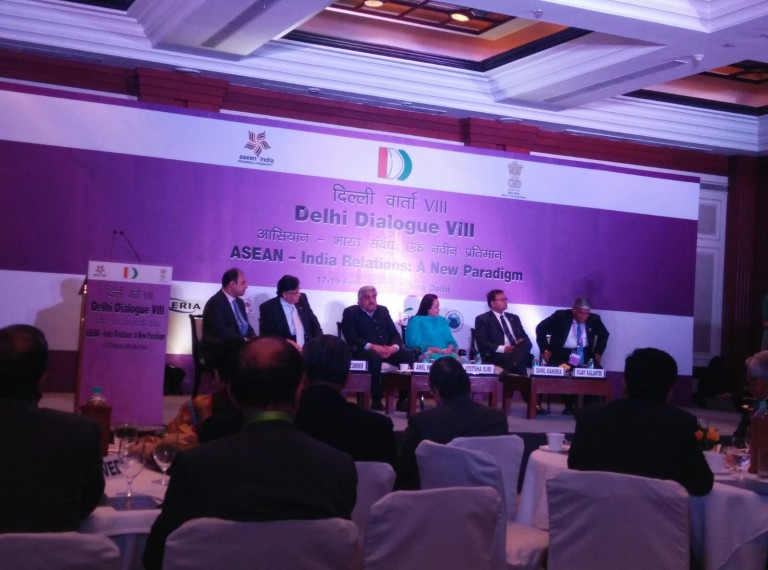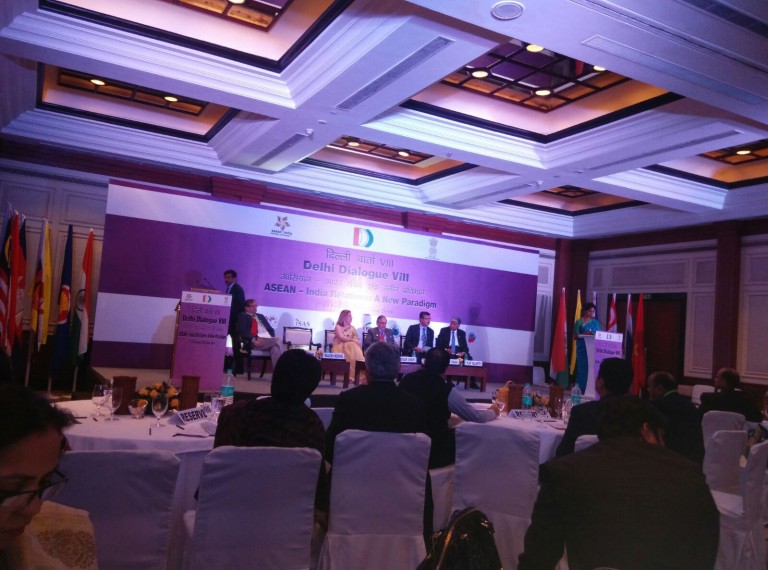- Home
- About
- Team
- About the President
- Mission
- Advisory bodies
- Associates
- Privacy Policy
- Terms and Conditions
- Cancellation, Returns & Refund Policy
- Pricing Policy
- Services
- Activities
- Events
- International Desk
- Sectors
- MSME
- Membership
- Publication
- Media
- Contact
3-Day Delhi Dialogue VIII gets under way ASEAN member nations urged to ratify Agreements On Trade in Services and Investments with India RCEP may see light of day soon: Secretary MEA
3-Day Delhi Dialogue VIII gets under way ASEAN member nations urged to ratify Agreements On Trade in Services and Investments with India RCEP may see light of day soon: Secretary MEA
The eighth edition of the Delhi Dialogue on the theme ‘ASEAN-India Relations: A New Paradigm’ got under way in NEW DELHI from February 17, 2016 with Mr. Anil Wadhwa, Secretary (East), Ministry of External Affairs, Government of India, giving a clarion call to those ASEAN member states who had not ratified the ASEAN-India Agreements on Trade in Services and Investments to endorse the pacts entered into last year.
Delhi Dialogue VIII was organized jointly by the Ministry of External Affairs, Government of India, the Federation of Indian Chambers of Commerce and Industry (FICCI) and Institute of Defence Studies and Analyses.
A session on Start ups and Digitization – The Way Forward was hosted by All India Association of Industries
Mr. Wadhwa in his inaugural speech said, “So far India, Brunei Darussalam, Malaysia, Myanmar, Singapore, Vietnam and Thailand have ratified the agreements. Lao PDR has ratified the Agreement on Trade in Services which came into force on 15 September 2015. Ratification of Agreement on Trade in Investment for Lao PDR, ratification of Agreements on Trade in Services and Investment by Cambodia, Philippines and Indonesia is awaited. Furthermore, the ASEAN-India Trade Negotiating Committee has been tasked to undertake a review of the ASEAN-India Trade in Goods Agreement, which came into effect on 1 January 2010, to optimize utilization.”
He said that enhancing India-ASEAN trade is a priority area under the new Plan of Action to implement the ASEAN-India partnership for peace progress and shared prosperity (2016-20). The Plan of Action envisages a number of steps in the areas of Trade and Investment, Finance, Transport, Food, Agriculture, Forestry, Information and Communication Technology, Tourism, Science, Technology and Innovation, and Mining and Natural Resources Management.
Mr. Wadhawa noted that negotiations on the Regional Comprehensive Economic Partnership (RCEP) have moved satisfactorily, with modalities being agreed in August 2015. “If the technical negotiations, which are under way, are completed swiftly, RCEP may turn into a dynamic reality very soon, particularly if we simultaneously succeed in forming regional value chains and production networks. With the TPP becoming a reality, expediting RCEP is in our interest,” he pointed out.
The Secretary said that in order to fully utilize the potential offered by the ASEAN-India Free Trade Area, there is a need to focus on building complementarities which can generate the necessary goodwill and trust.
“Our government is keen to facilitate cross border trade between our North Eastern States and neighbouring ASEAN countries by setting up more border trade points and border ‘haats’. Under the MOU on Border ‘Haats’ along the India-Myanmar border signed in 2012, it has been agreed to set up 9 ‘Haats’ or markets in the states of Arunachal Pradesh, Nagaland, Manipur and Mizoram. We have two Lands Customs Stations at Tamu-Moreh in Manipur and Rhi-Zowkhathar in Mizoram, and the Land Customs Station at Moreh is being upgraded into an Integrated Check Post,” Mr. Wadhwa observed.
On the programme ‘Start-up India, Stand-up India’, he said the Government of India has announced a 19-point action plan in January this year for setting up of Start-ups which would work towards innovation, development, deployment or commercialization of new products, processes or services that are driven by technology or intellectual property. He hoped that the Dialogue would come up with the broad contours of an ASEAN-India ecosystem to facilitate the convergence of technology, integration across diverse fields, distributed architecture and people willing to back an idea.
Mr. Vijay Kalantri, President, All India Association of Industries, said that the Delhi Dialogue is an effective platform to enhance our trade and investment with ASEAN. However, “we need to organize more meetings and panel discussions on a regular basis with ASEAN to explore trade and investment opportunities. We are looking at the West. We should focus on ASEAN not only because of the close proximity in terms of distance but more so because of the global crisis – ASEAN is an area we should seriously work with together to promote trade,” he said. An impediment which has not allowed trade to grow is lack of infrastructure such as rail, road, air and marine connectivity, he said and suggested that with regard to FTAs there is a need to look more closely at them and explore areas such as Digital, Renewable Solar Energy and Manufacturing for cooperation. There is also a lot of scope for SMEs from ASEAN and India to cooperate for collaborations, he said.
Start ups and Digitization – The Way Forward: The key points heighted in this session include:
[list]
- Technology is fast changing hence competition and sustainability will be the most important challenges startups will face
- ASEAN is the 4th largest economy and accounts for 600 million Middle income group. There is an excellent potential for startups from India to cooperate with ASEAN. Young talents, SMEs and their integration are forces that will shape the future markets
- US investors are looking at the Indian startups as India is offering them the largest market since China already has Its equivalents to FB, Twitter etc
- Though 95 percent of the startups fail initially but the iconic ones are always remembered, this is one of the reasons why the young and talented continue to be interested in starting their own businesses
- Governments need to improve ease of doing business and support infrastructure to enable the startups to sustain in this most competitive times.
- The Government has passed on various incentives for startups for the first 3 years. The question here is that many startups are not able to break even in the first two years and so hurdles like service tax and licensing should be done away with
- Most start ups register in Singapore so as to take advantage of the incentives.
- Startup loans and setting up facilities such as incubators is not enough, new areas of technology and digitization should be introduced
- Media plays a big role in the success of any business they should give sufficient coverage to the startups to create the much needed awareness.
- Startups contribute towards employment and hence should be encouraged.
- Indian start ups should think hard about what they have to offer. A vision to integrate technology with manufacturing is essential.
- Investment in SMEs is important
- Trade Barriers is an area we need to look at
- Digitization is important as is exchange of policies in the region is important, though language is an issue.
[/list]
In the valedictory sessions, it was noted that the Delhi Dialogue is the ideal format for Business, Ministers and Academics in the two regions to cooperate and engage in dialogue.
The following points emerged:
[list]
- 2017 is the Golden Jubilee year for ASEAN and silver Jubilee year for India ASEAN relations
- Geopolitical center of the world in now ASIA
- Integrating RVCs is important for the two regions and connectivity both physical and digital is important – soft and commercial.
- Facilitate labor movement within the region & India to facilitate e-visa for ASEAN countries.
- RCEP and TPP much complement each other.
- India and South East Asia constitute a community of 1.9 billion people, representing one-fourth of humanity and account for a combined GDP of US$ 4.75 trillion – substantive and invigorating relationship.
- Next edition should have more Chamber meetings
[/list]

Mr. Vijay Kalantri. President, All India Association of Industries with Mr. Anil Wadhwa, Secretary (East), Ministry of External Affairs, Government of India present with other dignitaries at the Delhi Dialogue VIII forum held in New Delhi from 17 – 19 February.
 From (L-R): Mr. Anirudh Suri, Founding Partner & Managing Director India Internet Fund, Dr Cassey Lee, Senior Fellow at the ISEAS – Yusof Ishak Institute, Singapore,Moe Myint Kyaw, Secretary General, Union of Myanmar Federation of Chambers of Commerce & Industry (UMFCCI) Managing Director: Myanmar Makro Industry Co., Ltd. Managing Director: Alligator Industry Co., Ltd.,Mr. Vijay Kalantri, President, All India Association Of Industries, Mr. Aman Neil Dokania, Vice President & GM HP Helion- Hewlett-Packard Asia Pacific and Vice Chairman of Asia Cloud Computing Association and Board member of US ASEAN Business Council and Mr. Sridhar Venkiteswaran, Executive Director, Avalon Consulting and OC&C Strategy Consultants, India at a panel discussion on Start-ups and Digitization – The Way Forward a session hosted by All India Association of Industries at DDVIII forum in New Delhi.
From (L-R): Mr. Anirudh Suri, Founding Partner & Managing Director India Internet Fund, Dr Cassey Lee, Senior Fellow at the ISEAS – Yusof Ishak Institute, Singapore,Moe Myint Kyaw, Secretary General, Union of Myanmar Federation of Chambers of Commerce & Industry (UMFCCI) Managing Director: Myanmar Makro Industry Co., Ltd. Managing Director: Alligator Industry Co., Ltd.,Mr. Vijay Kalantri, President, All India Association Of Industries, Mr. Aman Neil Dokania, Vice President & GM HP Helion- Hewlett-Packard Asia Pacific and Vice Chairman of Asia Cloud Computing Association and Board member of US ASEAN Business Council and Mr. Sridhar Venkiteswaran, Executive Director, Avalon Consulting and OC&C Strategy Consultants, India at a panel discussion on Start-ups and Digitization – The Way Forward a session hosted by All India Association of Industries at DDVIII forum in New Delhi.


Recent Posts
Categories
- Agriculture
- Banking and finance
- Biotechnology
- Business Process Outsourcing
- Chemicals
- Defence
- Drugs & Pharmaceuticals
- Economic Affairs & Taxation
- Energy
- Engineering
- Exports & Imports
- Food Processing
- Food Processing
- ICTE Manufacturing
- Inbound delegation
- Information & Communication Technology
- Infrastructure
- Innovation
- Logistics
- Manufacturing
- Media & Entertainment
- Medium & Small Scale Industry
- Micro
- Oil and Gas
- Petrochemicals
- Ports
- Power
- Press Information Bureau-Government of India
- Press Release
- Press Release: Quanzhou Delegation Explores Business Collaboration in India
- Renewable Energy
- Tourism & Hospitality
- Uncategorized
- Women Empowerment
Archives
- June 2025
- April 2025
- March 2025
- January 2025
- December 2024
- June 2024
- May 2024
- April 2024
- March 2024
- January 2024
- November 2023
- October 2023
- September 2023
- August 2023
- July 2023
- June 2023
- May 2023
- April 2023
- March 2023
- February 2023
- January 2023
- February 2022
- January 2022
- December 2021
- November 2021
- October 2021
- September 2021
- August 2021
- July 2021
- June 2021
- May 2021
- April 2021
- March 2021
- February 2021
- January 2021
- December 2020
- November 2020
- September 2020
- August 2020
- June 2020
- May 2020
- April 2020
- March 2020
- February 2020
- January 2020
- November 2019
- August 2019
- July 2019
- May 2019
- April 2019
- March 2019
- July 2018
- June 2018
- April 2018
- February 2018
- January 2018
- December 2017
- November 2017
- October 2017
- September 2017
- August 2017
- July 2017
- June 2017
- May 2017
- April 2017
- March 2017
- February 2017
- January 2017
- December 2016
- November 2016
- October 2016
- September 2016
- August 2016
- July 2016
- June 2016
- May 2016
- April 2016
- March 2016
- February 2016
- January 2016
- December 2015
- November 2015
- October 2015
- September 2015
- August 2015
- July 2015
- June 2015
- May 2015
- April 2015
- March 2015
- February 2015
- January 2015
- December 2014
- November 2014
- October 2014
- September 2014
- August 2014
- July 2014
- June 2014
- May 2014
- April 2014
- March 2014
- February 2014
- January 2014
